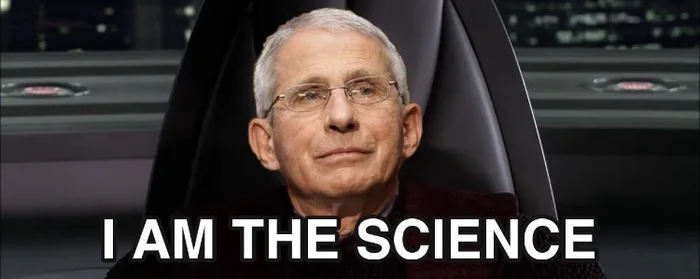Critical Thinking and The Problem of Faux Intellectual Authorities
This is the third post in our series on critical thinking, the first and second post can be found here and here respectively.
In the pursuit of knowledge and truth, critical thinking plays an essential role. However, a growing concern in the modern intellectual landscape is the rise of faux intellectual authorities who claim their beliefs are beyond question and reproach. These experts, self-proclaimed or not, often assert that questioning their views equates to attacking their entire scientific field and branding dissenters as deniers. This phenomenon undermines the foundation of critical thinking and stifles healthy debate. It results in more entrenched and dogmatic beliefs while we likely move further away from the truth.
The Essence of Critical Thinking
Critical thinking involves analyzing information objectively, questioning assumptions, and evaluating evidence before forming conclusions. It’s a skill that empowers individuals to navigate complex issues, discern truth from falsehood, and make informed decisions.
- Key Elements of Critical Thinking:
- Questioning Assumptions: Always question the underlying assumptions of any claim.
- Evaluating Evidence: Look for credible evidence supporting or refuting the claim.
- Logical Reasoning: Use logic to connect evidence and form conclusions.
- Open-Mindedness: Be willing to consider alternative perspectives and change your view when presented with new evidence.
The Rise of Faux Intellectual Authorities
Faux intellectual authorities often use their position, credentials, or popularity to assert their views as unquestionable truths. This can occur in various fields, including science, politics, and social issues. These individuals or groups discourage critical examination of their claims by portraying dissent as an attack on the entire discipline.

Examples of Faux Intellectual Authorities
- Climate Change Denial Accusations
- Some climate scientists argue that questioning certain aspects of climate science equates to denying the entire phenomenon of climate change. This approach can stifle legitimate scientific inquiry and debate.
- Reference: The Climate Files by Fred Pearce
- Medical and Pharmaceutical Claims
- Pharmaceutical companies and some medical professionals may present their research as beyond question, especially when large financial interests are at stake. Critics questioning drug efficacy or safety are often labeled as anti-science or conspiracy theorists.
- Reference: Bad Pharma by Ben Goldacre
- Nutrition and Dietary Guidelines
- The field of nutrition is rife with conflicting advice. Authorities in the field sometimes present their guidelines as the definitive answer, dismissing alternative viewpoints or new research as fringe or dangerous.
- Reference: The Big Fat Surprise by Nina Teicholz
The Danger of Unquestionable Authorities
The assertion that certain beliefs are beyond question can lead to several negative consequences:
Suppression of Scientific Inquiry
Scientific progress relies on questioning, testing, and refining ideas. Declaring certain topics off-limits stifles innovation and discovery.
- Reference: Karl Popper’s philosophy of science emphasizes the importance of falsifiability and open debate in scientific advancement.
- Additional Source: Conjectures and Refutations by Karl Popper
Erosion of Public Trust
When authorities dismiss legitimate questions and concerns, it can lead to a loss of trust in experts and institutions. This skepticism can fuel misinformation and conspiracy theories.
- Reference: Trust Me, I’m Lying by Ryan Holiday
Intellectual Stagnation
A healthy intellectual environment thrives on diverse perspectives and robust debate. When dissenting voices are silenced, intellectual progress stalls.
- Reference: John Stuart Mill’s “On Liberty” argues for the importance of free speech and the exchange of ideas in a progressive society.
Case Studies Highlighting the Issue
Case Study 1: The Game Changers (Vegan Documentary)

The Game Changers, a documentary distributed by Netflix, is a disinformation campaign. The documentary deserves its own post, which it will get, but I will quickly go through some of the financial incentives and ideologies behind the producers. Does this mean that a person can never produce something that holds dear to their heart? No. However, solely asking for the opinions of people who have clear financial motives is unlikely to result in anything resembling the truth.
We will look at the team on their own website: HERE and start from the top.
1. James Cameron
- Investment in Plant-Based Industry: James Cameron, one of the executive producers, is a well-known advocate for plant-based diets. He and his wife, Suzy Amis Cameron, are co-founders of Verdient Foods, a company that produces pea protein and other plant-based ingredients. This direct financial investment in the plant-based food industry presents a clear conflict of interest, as promoting veganism could directly benefit their business interests.
- Environmental Advocacy: Cameron is also a passionate environmentalist, often promoting the idea that plant-based diets are more sustainable than meat-based diets. This advocacy aligns with the film’s narrative, potentially influencing the way information is presented to favor veganism.
2. Suzy Amis Cameron
- Co-Founder of Verdient Foods: Like her husband, Suzy Amis Cameron has significant financial ties to the plant-based industry through Verdient Foods. Her advocacy for plant-based diets is not only a personal choice but also tied to her business interests, which could influence the documentary’s portrayal of veganism as beneficial for both health and the environment.
- Founder of Plant-Powered Initiatives: Suzy is also the founder of several plant-powered initiatives, including the MUSE School, which became the first school in the U.S. to be completely plant-based. Her deep commitment to veganism could bias the documentary’s content to favor a vegan lifestyle.
3. Arnold Schwarzenegger
- Advocate for Reduced Meat Consumption: Although Schwarzenegger is not a vegan, he has publicly supported reducing meat consumption for health and environmental reasons. His participation in the film aligns with his advocacy work, which could influence the documentary’s message to align with his personal beliefs, even if they are not entirely unbiased.
- Political Influence: As a former governor of California, Schwarzenegger has been involved in environmental policymaking, which includes promoting sustainable diets. This political background may influence the documentary’s narrative to promote veganism as part of a broader environmental agenda.
4. Jackie Chan
- Vegan Advocacy: Jackie Chan, another executive producer, has publicly supported plant-based diets and is an advocate for reducing meat consumption for health and environmental reasons. His involvement in the film likely reflects his personal beliefs, which could contribute to a biased portrayal of veganism as the optimal diet.
- Influence in Asia: Chan’s influence in Asia could be seen as a strategic move to promote veganism in a region where meat consumption is high. This could reflect a broader agenda to shift dietary habits in Asia, where economic growth has led to increased meat consumption.
5. Lewis Hamilton
- Vegan Athlete: Lewis Hamilton, the Formula 1 champion, has been a vocal advocate for veganism, citing its benefits for health, performance, and the environment. As a high-profile athlete featured in the documentary, his personal lifestyle choices could influence the film’s portrayal of veganism as the superior diet for athletes.
- Investment in Vegan Products: Hamilton has also invested in plant-based products and companies, such as Neat Burger, a vegan fast-food chain. His financial interests in the success of veganism as a trend could bias the way the documentary presents plant-based diets.
6. Chris Paul
- Vegan Athlete: NBA player Chris Paul has adopted a plant-based diet and has credited it with improving his performance and recovery. His role as an executive producer and a featured athlete in the film aligns with his personal experience, which could bias the documentary’s portrayal of veganism as beneficial for athletic performance.
- Promoter of Vegan Products: Paul has been involved in promoting plant-based products, further aligning his financial interests with the success of veganism. This connection could influence how the documentary frames plant-based diets as essential for health and performance.
7. Novak Djokovic
- Plant-Based Diet Advocate: Although Djokovic does not identify strictly as a vegan, he follows a largely plant-based diet and has credited it with helping him maintain peak physical condition. His involvement in the documentary reflects his belief in the benefits of plant-based nutrition for athletes, which could bias the film’s narrative.
- Owner of a Vegan Restaurant: Djokovic owns a vegan restaurant in Monte Carlo, which adds a financial incentive for promoting plant-based diets. This business interest could bias his contributions to the documentary, pushing the narrative that veganism is key to athletic success.
8. James Wilks
- Vegan Advocate: James Wilks is a strong advocate for veganism, having adopted a plant-based diet himself. His commitment to veganism goes beyond personal lifestyle choices and extends into advocacy, which can influence how he presents information in the documentary. This personal bias could lead to a one-sided portrayal of the benefits of veganism, potentially downplaying or ignoring any downsides or alternative perspectives.
- Business Ventures: Wilks has financial ties to the plant-based industry through his involvement in businesses that promote vegan products and lifestyles. While specific details about his investments or business ventures are not always disclosed, it is common for prominent advocates to have financial interests in industries they support. This creates a potential conflict of interest, as promoting veganism could directly benefit his financial investments.
- Personal Branding and Professional Success: As the central figure in The Game Changers, the success of the documentary is closely tied to Wilks’ personal brand. His reputation as a fitness expert and former MMA fighter is bolstered by the documentary’s positive reception. This creates an incentive to present veganism in the best possible light, potentially at the expense of objectivity.
- Research Bias: Wilks has been criticized for selectively presenting research that supports veganism while dismissing or ignoring studies that may present a more nuanced or critical view. This selective use of evidence can mislead viewers and create a biased narrative that aligns with his personal beliefs and advocacy goals.
What we see is a large number of faux intellectual authorities with massive conflicts of interest who push their ideological beliefs, which they also have a vested financial interest in. Laughably, James Wilks often cites conflicts of interest in scientific papers that show meat is healthy while completely disregarding his own clear conflicts of interest and biases when reporting on veganism through this documentary.
Case Study 2: The Galileo Affair
Galileo Galilei’s support for heliocentrism was met with fierce opposition from the Catholic Church, which held geocentric views as unquestionable. His persecution highlights the dangers of dogmatic authority suppressing scientific advancement, and also the problems of scientific consensus as the “be all and the end all”. The consensus was that the world was flat, which Galileo and Copernicus argued against.
Case Study 3: The Cholesterol Controversy
For decades, dietary guidelines promoted low-fat diets to reduce cholesterol and heart disease. However, emerging research suggests that certain fats are not as harmful as previously thought, and the initial guidelines may have been influenced by flawed studies and industry funding.
Reference: The Cholesterol Myths by Uffe Ravnskov
The Role of Political and Financial Incentives
Faux intellectual authorities typically thrive in fields ripe with political and financial incentives. The influence of money and power can create an environment where challenging the status quo is discouraged. Here are some fields where this phenomenon is particularly prevalent:
Climate Science
The debate over climate change is heavily influenced by political agendas and financial interests. Governments, corporations, and advocacy groups often fund research that supports their positions, leading to accusations of bias and conflicts of interest.
- Example: Climate change policies can have significant economic impacts, leading to intense lobbying and funding of research to support various viewpoints.
Medical and Pharmaceutical Industries
The pharmaceutical industry is a prime example of financial incentives driving research and public discourse. Companies invest heavily in clinical trials and marketing to promote their products, often leading to questions about the objectivity of the research.
- Example: Drug companies have been known to fund studies that favor their products, raising concerns about the validity of the findings.
- Reference: “Who pays for the pizza? Redefining the relationships between doctors and drug companies” (R. Moynihan, 2003)
Nutrition and Health Guidelines
Nutrition science is another area where financial interests can skew research. Food and beverage companies fund studies that promote their products, and official dietary guidelines can be influenced by industry lobbying.
- Example: The sugar industry has funded research downplaying the health risks of sugar consumption, while promoting studies that blame fat for health issues.
- Reference: “Sugar Industry and Coronary Heart Disease Research” (Kearns et al., 2016)
Contrast with Fields Less Influenced by Financial Incentives
In contrast, fields like theoretical physics and mathematics are less susceptible to the influence of political and financial incentives. In these areas, questioning established theories is a fundamental part of the scientific process.
Physics and the Big Bang Theory
In fields like physics, questioning established theories is encouraged and seen as a path to deeper understanding. For example, the Big Bang theory, while widely accepted, is continually tested and refined through observation and experimentation.
- Example: Physicists welcome challenges to the Big Bang theory as opportunities to expand knowledge and refine models of the universe.
Encouraging Critical Thinking in the Face of Authority
To combat the rise of faux intellectual authorities, it’s crucial to foster a culture that values and practices critical thinking. Here are some strategies:
Promote Open Dialogue
Encourage discussions that welcome diverse viewpoints and constructive criticism. Create spaces where questioning and debate are seen as positive and essential for growth.
Teach Critical Thinking Skills
Education systems should prioritize teaching critical thinking from an early age. Equip students with the tools to evaluate information, question assumptions, and think independently.
Encourage Transparency and Accountability
Institutions and authorities should be transparent about their methodologies, funding sources, and potential conflicts of interest. Accountability fosters trust and encourages critical engagement.
Considering Alternative Perspectives
Be open to alternative viewpoints and consider how they challenge or support the claim in question. This helps to avoid confirmation bias and promotes a more nuanced understanding.
Conclusion
Critical thinking is the cornerstone of intellectual progress and societal advancement. By recognizing and challenging faux intellectual authorities, we can uphold the values of inquiry, debate, and evidence-based reasoning. Encouraging a culture of questioning and critical analysis ensures that ideas are continuously tested and refined, leading to a more informed and enlightened society.





